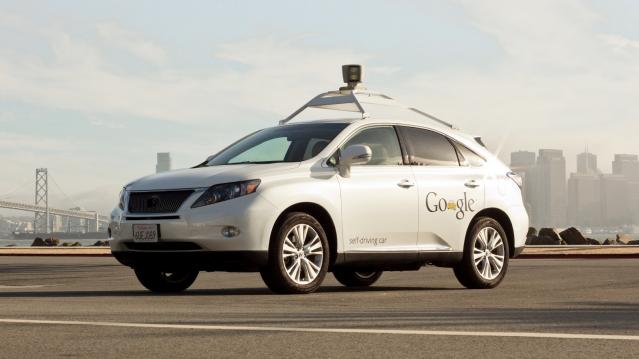Why Google Needs to Build a Better Bumper

Google unleased its self-driving fleet in real traffic and let the cars cruise a total of a million miles with back-up drivers ready to hit the brakes or take the wheel. The humans didn’t take control.
As it turned out, there were 11 minor accidents and no injuries, according to Google’s Chris Umson, who claimed that none of the fender benders was Google’s fault. He told the Associated Press that all the self-driving cars behaved well (not bad, considering the cars just got their learners’ permits). He also said most were hit from behind.
Not so fast, Google. Delphi, which automated the Audi SQ5, claims its car was broadsided by a Google car. Hmmm. Lexus vs. Audi, Google vs. Delphi—sounds like bumper cars!
Related: Driverless Self-driving Truck of the Future Will Crash Into Labor Laws of the Past
Other companies have permits to test their driverless cars including Daimler/Mercedes, Honda, and Nissan with Volkswagen and a host of others on tap.
This is not going away—and in the case of Daimler, they’ve extended the technology to trucks.
For older people and the disabled, who need a little help driving and parking, an autonomous car could be the difference between independence and a shut-in life.
If, on the other hand, these cars decide to “think,” we could all be in trouble.
Attention Autobots! Start Your Engines!
Small Business Owners Say They’re Raising Worker Pay
A record percentage of small business owners say they are raising pay for their workers, according to the latest monthly jobs report from the National Federation of Independent Business, based on a survey of 10,000 of the group’s members. A seasonally adjusted net 35 percent of small businesses say they are increasing compensation. “They are increasing compensation at record levels and are continuing to hire,” NFIB President and CEO Juanita Duggan said in a statement accompanying the report. “Post tax reform, concerns about taxes and regulations are taking a backseat to their worries over filling open positions and finding qualified candidates.”
The US Is Running Short on More Than 200 Drugs

The U.S. is officially running short on 202 drugs, including some medical staples like epinephrine, morphine and saline solution. “The medications most vulnerable to running short have a few things in common: They are generic, high-volume, and low-margin for their makers—not the cutting-edge specialty drugs that pad pharmaceutical companies’ bottom lines,” Fortune’s Erika Fry reports. “Companies have little incentive to make the workhorse drugs we use most.” And much of the problem — “The situation is an emergency waiting to be a disaster,” one pharmacist says — can be tied to one company: Pfizer. Read the full story here.
Chart of the Day: Could You Handle a Sudden $400 Expense?

More Americans say they are living comfortably or at least “doing okay” financially, according to the Federal Reserve’s Report on the Economic Well-Being of U.S. Households in 2017. At the same time, four in 10 adults say that, if faced with an unexpected expense of $400, they would not be able to cover it or would cover it by selling something or borrowing money. That represents an improvement from 2013, when half of all adults said they would have trouble handling such an expense, but suggests that many Americans are still close to the edge when it comes to their personal finances.
Kevin Brady Introduces Welfare Reform Bill

The Tax Policy Center’s Daily Deduction reports that Rep. Kevin Brady (R-TX), chair of the House Ways and Means Committee on Friday introduced The Jobs and Opportunity with Benefits and Services (JOBS) for Success Act (H.R. 5861). “The bill would rename the Temporary Assistance for Needy Families (TANF) program and target benefits to the lowest-income households. Although the House GOP leadership promised to include an expansion of the Earned Income Tax Credit as part of an upcoming welfare reform bill, this measure does not appear to include any EITC provisions.” The committee will mark up the bill on Wednesday.


